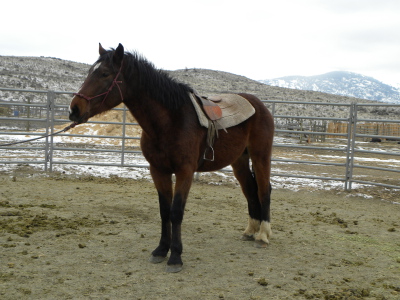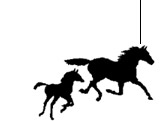|
We Call Him Atticus
Saving feral horses from slaughter in B.C.
After a reporter's expose on the activities of the Kamloops Ministry of Natural Resources round up of feral horses in the Deadman Valley of B.C. and their subsequent arrival and sale at the Kamloops stockyard, concerned citizens raised an outcry. Critteraid was contacted due to our previous involvement with the feral horses and our development of Project Equus in 2009. Critteraid, which operates a small animal sanctuary in Summerland, B.C., took the challenge and stepped up to the plate by contacting the ministry and offering to take these horses to save them from slaughter.
On February 18, 2011 the Honourable Steve Thomson, the Minister of Natural Resource Operations, used his discretionary power and had the horses surrendered to Critteraid. He also stated that he had directed staff to review current legislation and policies to find a long term solution that will save other seized, unbranded and ownerless horses from going to slaughter. By taking this action, he changed the fate of these horses, giving them a second chance at finding a lifetime home. At auction horses are basically sold by the pound to what are known as "kill buyers". The horses are then sent to one of the Canadian slaughter houses where they ultimately are butchered, mostly for human consumption overseas. However horse meat is available in Canada and is served in some restaurants, mainly in larger cities such as Vancouver.
Atticus is our first Ministry horse. You will understand our choice of the name "Atticus" if you've read the book, or seen the film, "To Kill a Mockingbird". The character has a strong sense of morality and justice, and that is what we want for the feral horses of B.C. We call him Atticus
as a fitting start to the rescue of these horses from slaughter.

While Critteraid is opposed to sending these horses to slaughter, we also understand the hardship that the overpopulation of these horses creates upon the land itself. This situation is addressed at length in the Project Equus documents. The increase in the number of horses on the land creates competition with the natural inhabitants of the land to flourish, let alone give sustenance to the animals that roam on it. From the overgrazing of the horses, the land becomes barren and can, and does, die.
The law gives the Ministry the power and the authority to impound these horses and keep them for a period of 30 days to allow time for an owner to come forward and claim their horses. In most cases, nobody does and the horses are then dispatched to whatever means available. Up until now, we speculate that 99% of those horses were slaughtered. Bravo to Minister Thomson and the men and women of the Ministry of Natural Resource Operations for taking the road less traveled and allowing the alternative. It can't have been an easy decision for them to make and we are truly grateful to them for their insight and courage to make this change.
However, we do not want this partnership with the Ministry to end with the rescue of these six horses. It is Critteraid's goal to continue to work with the Ministry to prevent feral horses from going to slaughter in the future not just by adoption but by working with them on alternative solutions.
Our original focus was and still is promotion of population control through the application of the equine birth control known as PZP to the mares living freely on the land. Over the last few years, Critteraid has provided training for this application to one of the members of the Penticton Indian Band. When used, the mares are darted with the vaccine and record keeping and cataloguing of the horses is carefully kept to evaluate the decline in population. The vaccine controls the population without causing permanent sterilization to the mares, and will allow the land to regain life. This is not a new idea. Dr. Jay Kirkpatrick and his team have been involved in successfully controlling wild horse populations in the U.S. for twenty years using this vaccine. It addresses so many more possibilities that provide a future without horse slaughter as an option.
This is an ambitious project for the small group of volunteers at Critteraid and our goal is to network with other horse rescue groups and animal welfare societies. TRACS from Westbank has already been helping with fundraising for the costs associated with the transfer of ownership of these first six horses.
Once halter trained and vet checked, these horses will all be available for adoption. If you would like to help in any way please visit our website . You will be able to follow these horses as they move through training and eventual adoption.
Email enquires can be made at projectequus@critteraid.org.
By Theresa Nolet
"Help us lead Canada's horses away from barbarism . .
and into the protected pastures of a civilized
nation."
|


